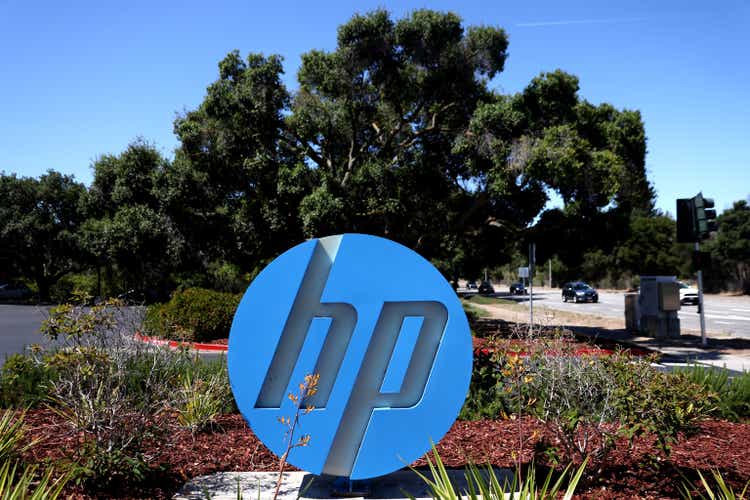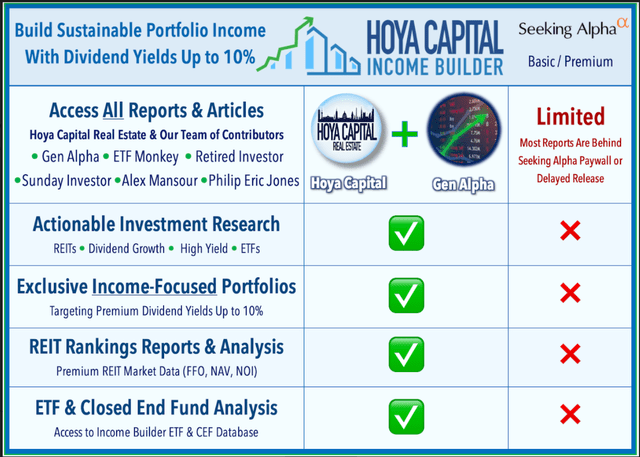HP Inc.: A Buffett-Style Dividend Bargain
Summary
- HP Inc. remains a good investment option due to its strong cash flows, capital returns, and undervaluation, despite a recent downturn in the PC market.
- The company has managed to maintain profitability and is on track with its targeted cost savings, with a plan to deliver a significant portion of its 3-year cost savings by the end of this year.
- HPQ is reducing its debt and offers a meaningful dividend income, making it an attractive option for value investors seeking long-term capital gains.
- Looking for a portfolio of ideas like this one? Members of Hoya Capital Income Builder get exclusive access to our subscriber-only portfolios. Learn More »
Justin Sullivan
With every new generation come with dreams of riches to be made from the stock market, and it seems the latest craze around speculative growth names in the AI space has gotten plenty of attention.
While capital gains can be fun to see on paper, realizing those gains can come at a substantial cost. For one thing, short-term capital gains are taxed as ordinary income rates, which can take a big bite out of those hard won gains.
That's why 'been there, seen that'-investors are keen to pick income generating names that are undervalued with capital appreciation potential and meaningful income to boot. These investors know that the key to long-term wealth isn't just about how much you make, but about how much you keep and continue to make through recurring income.
This brings me to HP Inc. (NYSE:HPQ), which I last covered here back in January, highlighting its strong cash flows and capital returns. The stock has performed well since then, giving investors an 11.6% total return, thanks in part to dividends, nearly matching the 12% return of the S&P 500 (SPY) over the same timeframe. In this article, I discuss why HPQ remains a good bargain for potentially rewarding long-term returns from here.
Why HPQ?
HP Inc. is a leading player in the mature industry for personal computers, printers, and imaging equipment, having been formed after its former parent split into two companies, with the other one being HP Enterprise (HPE). Beyond consumers, HPQ also does substantial business with corporations, as their employees need new laptops every 2-3 years.
HPQ strikes me as one of those companies that investment legend Peter Lynch would describe as a company that MBAs don't want to go to, and that's a good thing, as it's a business that doesn't require a ton of constant innovation. That's also likely why Warren Buffett invested in HPQ last year through Berkshire Hathaway (BRK.A)(BRK.B), becoming its largest shareholder past Vanguard. Investors today are getting an even better deal, as Buffett paid ~$40 per share for his initial stake.
It's no secret that HPQ largely benefitted during the 2020-2022 timeframe, when work from home trends and corporate hiring were robust. As with all good things, those times have slowed down, as reflected by net revenue declining by 18% YoY on a constant currency basis during the fiscal second quarter, due primarily to headwinds that are felt across the industry.
Notably, despite personal systems revenue (representing 46% of revenue) being down by 29% YoY, management was able to maintain a flat PS operating margin of 5.4% on a sequential basis, due to variable cost management. HPQ is on track with its targeted cost savings, with the objective of delivering 40% of its 3-year cost savings by the end of this year.
HPQ remains a highly profitable enterprise relative to its sector, due in large part to its highly profitable printing op margin of 19%. As shown below, HPQ scores an A grade for profitability with above median EBITDA and Net Income margins.
Looking ahead, it's easy to buy into risks around a prolonged slump in PC demand, and while that may be the case for the remainder of the year, I don't believe this is going to be a long-term trend, especially after the current elevated inventory levels are worked down.
Plus, management believes that hybrid work is here to stay, and that may well be true. This is considering that even tech giants like Meta (META) and Google (GOOGL) are requiring employees back into the office just 3 days a week, giving them 2 days a week to work from home.
During an industry conference hosted by Bank of America (BAC) last week, management noted that there are 19 million rooms belonging to professional households out there, and that only 10% of those rooms are fully kitted out for productivity. This implies that there remains plenty of greenfield opportunity for HPQ and its competitors to serve this underserved market over the near to medium term.
Meanwhile, HPQ remains solidly profitable, generating $0.5 billion in free cash flow in the last reported quarter, more than covering its $0.3 billion dividend. The dividend is also well-covered from a TTM earnings perspective, with a 29.8% payout ratio.
While HPQ didn't repurchase any shares in the last reported quarter, it is making good progress toward debt reduction, having paid down long-term debt by $449 million since October 2022 (end of fiscal year 2022). It also has a BBB investment grade credit rating from S&P and a very reasonable net debt to TTM EBITDA ratio of 1.9x.
Lastly, HPQ remains a good value at the current price of $30.75 with a forward PE of 9.1. This implies that HPQ would be getting an attractive 11% earnings yield on share buybacks if and when they resume. The current valuation remains a low bar in terms of expectations, with even mid-single digit annual EPS growth being appealing, and analysts expect 6% to 8% annual EPS growth over the next 2 years. Considering all the above, I view a forward PE in the range of 10 to 12 to be reasonable, which could result in potential double-digit total returns including the 3.4% dividend yield.
Investor Takeaway
HPQ is a good option for investors looking to gain exposure to the IT sector at an attractive valuation, while also getting meaningful dividend income. The company remains solidly profitable despite the recent PC downturn, which I don't view as lasting into perpetuity.
Meanwhile, the company is reducing debt and remains far below the level at which Buffett initially paid for it through Berkshire Hathaway. As such, value investors may want to give HPQ a hard look at the present level for income and potentially rewarding long-term capital gains.
Gen Alpha Teams Up With Income Builder
Gen Alpha has teamed up with Hoya Capital to launch the premier income-focused investing service on Seeking Alpha. Members receive complete early access to our articles along with exclusive income-focused model portfolios and a comprehensive suite of tools and models to help build sustainable portfolio income targeting premium dividend yields of up to 10%.
Whether your focus is High Yield or Dividend Growth, we’ve got you covered with actionable investment research focusing on real income-producing asset classes that offer potential diversification, monthly income, capital appreciation, and inflation hedging. Start A Free 2-Week Trial Today!
This article was written by
I'm a U.S. based financial writer with an MBA in Finance. I have over 14 years of investment experience, and generally focus on stocks that are more defensive in nature, with a medium to long-term horizon. My goal is to share useful and insightful knowledge and analysis with readers. Contributing author for Hoya Capital Income Builder.
Analyst’s Disclosure: I/we have a beneficial long position in the shares of HPQ either through stock ownership, options, or other derivatives. I wrote this article myself, and it expresses my own opinions. I am not receiving compensation for it (other than from Seeking Alpha). I have no business relationship with any company whose stock is mentioned in this article.
I am not an investment advisor. This article is for informational purposes and does not constitute as financial advice. Readers are encouraged and expected to perform due diligence and draw their own conclusions prior to making any investment decisions.
Seeking Alpha's Disclosure: Past performance is no guarantee of future results. No recommendation or advice is being given as to whether any investment is suitable for a particular investor. Any views or opinions expressed above may not reflect those of Seeking Alpha as a whole. Seeking Alpha is not a licensed securities dealer, broker or US investment adviser or investment bank. Our analysts are third party authors that include both professional investors and individual investors who may not be licensed or certified by any institute or regulatory body.
Recommended For You
Comments (1)

i.imgur.com/...




